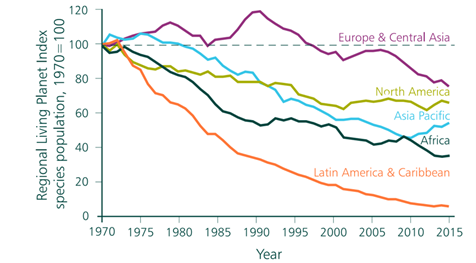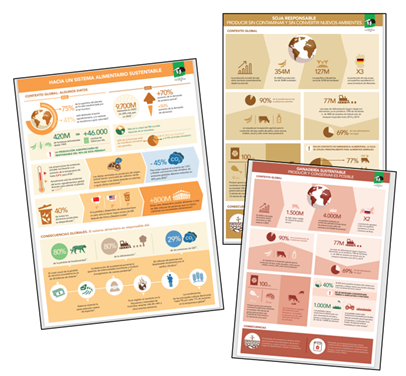Argentina: fostering sustainable agriculture and biodiversity conservation
The Netherlands, as many countries, is busy writing their National Biodiversity Strategy Action Plan. One of the agreed upon targets focuses on reducing the global footprint of consumption, which is the major cause of biodiversity loss. Humanity’s use of biological resources continues to exceed the earth’s capacity to regenerate them. It is essential that the reduction occurs in an equitable manner. Currently some areas of the world are having a disproportionately large impact on the global footprint of consumption while others are consuming resources at far lower rates. The Netherlands is committed to reducing her footprint in the Netherlands as well as abroad.
Fundación Vida Silvestre Argentina (WWF) as many other partners, is paving the way for a transformative journey, marked by innovative strategies, data-driven insights, and a profound commitment to fostering a harmonious coexistence between agricultural development and the preservation of the nation's rich biodiversity. This work will be offered as input to contribute to Argentina National strategy and plans to halt climate change, nature conservation & biodiversity risks.
By analyzing trends in land use, greenhouse gas emissions, and biodiversity loss, they have been able to identify critical areas for intervention and implement targeted strategies that promote more sustainable agricultural practices.
Understanding the Challenge
The recent report released by Fundación Vida Silvestre highlighted the intricate relationship between Argentina's agricultural prowess and the pressing environmental challenges posed by deforestation and unsustainable production practices. As the global demand for agricultural commodities continues to surge, the country finds itself at a critical juncture, grappling with the need to balance economic growth with the imperative to safeguard its diverse ecosystems.
The report underscored the alarming impact of deforestation on the country's natural habitats, emphasizing that a significant portion of this environmental degradation is associated with the expansion of soybean cultivation and cattle ranching. Moreover, the adverse effects on biodiversity, greenhouse gas emissions, and the well-being of local communities have raised urgent concerns about the sustainability of current agricultural practices.

Initiatives to Combat Deforestation and Foster Sustainable Production
In response to these challenges, the collaboration between the Agricultural Office and Fundación Vida Silvestre has mapped initiatives aimed at curbing deforestation and promoting sustainable production models. One of the key focal points found has been the different initiatives of comprehensive monitoring systems to trace the origins of agricultural products and ensure compliance with sustainable practices.
By advocating for robust certification protocols and traceability standards, this public-private partnerships laid the groundwork for more transparent and accountable supply chains, ensuring that agricultural exports meet stringent sustainability criteria such as the EU Deforestation regulation.
Furthermore, the implementation of land management policies and regulations, guided by the principles of responsible farming and biodiversity conservation, has played a pivotal role in curbing the rampant deforestation that has plagued Argentina in recent years. Leveraging their collective expertise, the Agricultural Office and several partners have actively supported the restoration of degraded ecosystems and the conservation of protected areas, safeguarding the country's natural heritage and contributing to minimize the footprint of those production chains/products imported by The Netherlands.
Through their collaborative endeavors, the two entities have utilized data-driven insights to drive informed decision-making within the agricultural sector. By analyzing trends in land use, greenhouse gas emissions, and biodiversity loss, they have been able to identify critical areas for intervention and implement targeted strategies that promote more sustainable agricultural practices. The emphasis on comprehensive research and analysis has enabled the development of tailored solutions that address the root causes of deforestation while fostering a culture of environmental stewardship among local farmers and stakeholders; international stakeholders represented in the region, NGO’s and IFI’s.

Promoting a Holistic Approach to Conservation - Paving the Way for a Sustainable Future
Central to the partnership between The Netherlands Agricultural Office Cono Sur and Fundación Vida Silvestre is the shared vision of promoting a holistic approach to conservation that transcends traditional boundaries. By emphasizing the interdependence between agricultural activities and biodiversity preservation, the collaboration has fostered a deeper understanding of the intricate balance that exists between human development and ecological integrity. Through research, reports, workshops, and outreach initiatives, the partnership has strived to instill a culture of sustainability and environmental consciousness, encouraging stakeholders to embrace and support practices and initiatives that prioritize the long-term health of both agricultural landscapes and natural ecosystems.
As Argentina continues to navigate the complexities of sustainable agricultural development, the collaborative efforts stand as a testament to the transformative power of collective action. By bridging the gap between agricultural productivity and environmental conservation, the partnership has set a precedent for meaningful change, laying the foundation for a more resilient and sustainable agricultural sector that champions the protection of biodiversity and the preservation of natural resources.
In the pursuit of a sustainable future, the commitment to collaboration, data-driven insights, and innovative solutions remains the cornerstone of the joint efforts. . Together, they serve as beacons of hope, illuminating a path towards more sustainable and ecologically vibrant production chains.
If you’re interested or looking to get in depth information about these initiatives or the work done in the region by the Agricultural Office, do not hesitate to contact us: BUE-LNV@minbuza.nl!